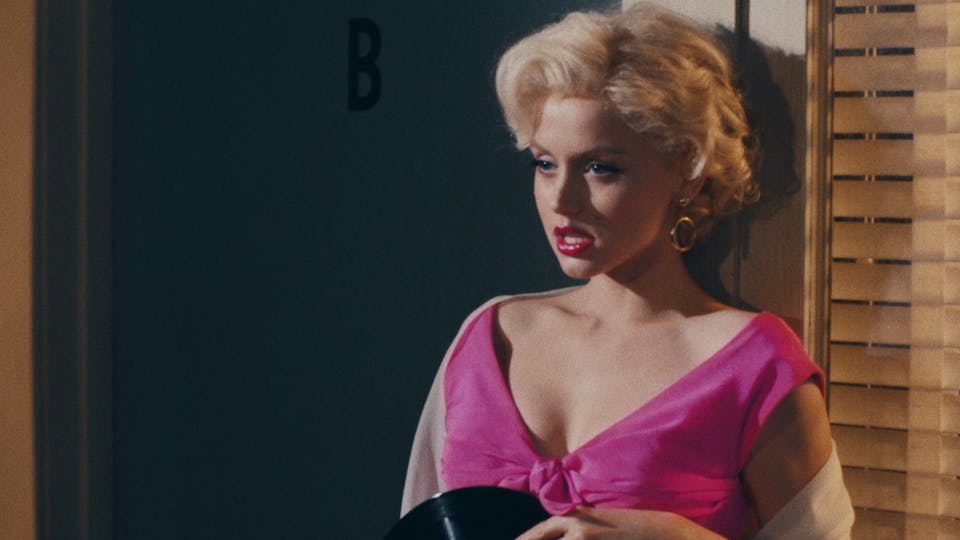
Blonde Review
Opening with scenes of child abuse, Andrew Dominik's Blonde starts as it means to go on: by inviting us to browse an extensive rogues’ gallery of people who wronged Marilyn Monroe. These people range from the lightly patronising or averagely sexist, all the way through to the perpetrators of physical and sexual assault.

Slotted in-between the misery vignettes, we’re treated to impeccable reconstructions of famous or relevant moments from Monroe’s films — scenes like Addison DeWitt in All About Eve advising Monroe's wannabe-actor character to go and make a producer very happy if she wants to get ahead in showbiz. These scenes are uncanny and beautiful, and could form a separate art project in their own right, like Gus Van Sant's mostly frame-for-frame 1998 Psycho remake. Blonde also contains moments of gorgeous erotic surrealism, including a threesome filmed as an elegantly distorted kneading of flesh into strange new configurations, like a sexy version of the climax of Brian Yuzna's Society.
Ana de Armas' performance is powerful, but her wings feel clipped.
The film is based on the book of the same name by Joyce Carol Oates, but of course a book can't include cinematic reconstructions, visual trickery or music (Nick Cave and Warren Ellis' elegant score evokes Angelo Badalamenti's work on Twin Peaks, to splendid effect). The book does include all of the misery and abuse, but also attempts to give us a fuller picture of the light alongside the shade, and an interior perspective on Monroe’s ambition. Monroe was intelligent and worked hard in a number of different ways to achieve her fame, but the film is rather vague on her journey to stardom, preferring to depict her as a butterfly brutally broken on the wheel, time and time again.
It is not the job of a biopic to try to create an objective photocopy of its subject; it's not possible to comprehensively convey every aspect of somebody’s life. Choices have to be made. What a good biopic must do is decide on what angle they want to take. The portrait that this film paints of Monroe depicts a little girl lost, who repeatedly calls her lovers ‘Daddy’ and reacts to almost every new setback with the same tremulously teary ingénue's pout. Ana de Armas’ performance is powerful, but her wings feel clipped; there's only a limited sense across the hefty runtime that Monroe is evolving as a result of what she experiences.
Perhaps one difficulty is that the visual Marilyn image is too powerful — who would willingly dismantle it? While a book can talk about how Marilyn existed as a separate entity to Norma Jeane, and allow us to mentally picture the real woman who exists before stepping on set, a visual medium like cinema must make a choice to show this or not, and Dominik opts to give us a perfect-looking Marilyn in every shot, no matter how absolutely at odds with or alienated from her screen persona Norma Jeane is feeling; more interested in sensual surfaces than interior lives, Blonde is elusive.
There’s a fine line between depicting the way Marilyn Monroe was underestimated, and joining in with that assessment. Blonde doesn’t always wind up the right side of that line, but has spectacular visual fireworks to spare.
Related Articles

Ana De Armas’ Insecurities About Playing Marilyn Monroe Helped Her Make Blonde: ‘That’s Exactly What She Would Be Feeling’ – Exclusive Image
Movies |

Marilyn Monroe Movie Blonde ‘Is Supposed To Create Controversy And Discomfort’, Says Ana De Armas – Exclusive
Movies |

Ana De Armas Plays A Tortured Marilyn Monroe In Netflix’s Blonde Trailer
Movies |

Ana De Armas Is Marilyn Monroe In The Blonde Teaser
Movies |































![iFi's GO Bar Kensei Dongle DAC Supports K2HD Technology With Some Samurai Swagger [Updated] iFi's GO Bar Kensei Dongle DAC Supports K2HD Technology With Some Samurai Swagger [Updated]](https://i0.wp.com/cdn.ecoustics.com/db0/wblob/17BA35E873D594/33FF/45A11/QTXOLJR4xDKSNMMk2WlTgjaIlvSgcYpeU1xJzUwIoYs/ifi-go-bar-kensei.jpg?w=768&ssl=1)
























